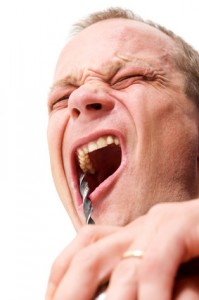 Okay, I understand getting to the dentist when you have an emergency can sometimes be hard. And, yes I realize that it’s awfully tempting to try and fix the problem yourself. But, there are just some things you should not do at home. This brings us to this weeks blog post. The WORST home remedies for dental problems.
Putting garlic against a sore tooth…. Besides making you smell bad, garlic is very potent and can irritate or burn soft tissues around the tooth causing even more pain and sensitivity.
Shaving down a sharp tooth with tools from around the house… Besides the fact that you are putting something that has seen more dirty surfaces than I’d care to mention directly into your mouth, you are putting yourself at risk for damaging the tooth more or slipping and causing damage to your cheeks and gums.
Using crazy glue to fix a broken natural tooth... Yes, I know people say the same stuff that’s in super glue is the same stuff used to seal battlefield wounds, and they’d be correct. However, the stuff used to seal battlefield wounds are made specifically to seal battlefield wounds. Using superglue to fix a tooth most likely will result in 1: You super gluing your finger to your lip, cheek, tooth or some variation of the aforementioned. Or 2: Pain from a tooth with a freshly injured dental nerve being assaulted by a brand of material that was not meant to see the inside of your mouth or to fix broken teeth. Trust me, its not pretty….
Whitening your teeth with lemon juice and baking soda… This one, although its gotten a lot of popularity throughout the years, is just not healthy for your teeth. Mixing an abrasive and an acid together and then scrubbing it on your teeth can cause abrasion to your gums while also removing and/or damaging the enamel on your teeth.
And lastly, searching through your medicine cabinet and finding a left over prescription from those wisdom teeth you (or someone you know) had extracted about ten years ago… Its not a mystery that taking old, expired or another persons prescription medications is a bad idea. Taking one or two remaining capsules of an antibiotic is not only ineffective, it can also help promote bacterial resistance to antibiotics. Also, taking prescription medications that were not prescribed to you can put you right in the middle of an adverse or even allergic reaction to a drug that no one knows you are taking. So if you are having a problem call your dentist or doctor first before resorting to whats left over in the medicine cabinet. Also, whenever you are prescribed medication once you have finished the prescription if there are any tablets remaining they should be disposed of.
So, I’m not saying there are not some things that you can do at home in a pinch to get you by until you can see your dentist. But, in an emergency situation, first and foremost, call your dentist and see when they can see you for an appointment and tell them your emergency. Your dentist will suggest the best way to get you comfortable and safely treated!]]>
Okay, I understand getting to the dentist when you have an emergency can sometimes be hard. And, yes I realize that it’s awfully tempting to try and fix the problem yourself. But, there are just some things you should not do at home. This brings us to this weeks blog post. The WORST home remedies for dental problems.
Putting garlic against a sore tooth…. Besides making you smell bad, garlic is very potent and can irritate or burn soft tissues around the tooth causing even more pain and sensitivity.
Shaving down a sharp tooth with tools from around the house… Besides the fact that you are putting something that has seen more dirty surfaces than I’d care to mention directly into your mouth, you are putting yourself at risk for damaging the tooth more or slipping and causing damage to your cheeks and gums.
Using crazy glue to fix a broken natural tooth... Yes, I know people say the same stuff that’s in super glue is the same stuff used to seal battlefield wounds, and they’d be correct. However, the stuff used to seal battlefield wounds are made specifically to seal battlefield wounds. Using superglue to fix a tooth most likely will result in 1: You super gluing your finger to your lip, cheek, tooth or some variation of the aforementioned. Or 2: Pain from a tooth with a freshly injured dental nerve being assaulted by a brand of material that was not meant to see the inside of your mouth or to fix broken teeth. Trust me, its not pretty….
Whitening your teeth with lemon juice and baking soda… This one, although its gotten a lot of popularity throughout the years, is just not healthy for your teeth. Mixing an abrasive and an acid together and then scrubbing it on your teeth can cause abrasion to your gums while also removing and/or damaging the enamel on your teeth.
And lastly, searching through your medicine cabinet and finding a left over prescription from those wisdom teeth you (or someone you know) had extracted about ten years ago… Its not a mystery that taking old, expired or another persons prescription medications is a bad idea. Taking one or two remaining capsules of an antibiotic is not only ineffective, it can also help promote bacterial resistance to antibiotics. Also, taking prescription medications that were not prescribed to you can put you right in the middle of an adverse or even allergic reaction to a drug that no one knows you are taking. So if you are having a problem call your dentist or doctor first before resorting to whats left over in the medicine cabinet. Also, whenever you are prescribed medication once you have finished the prescription if there are any tablets remaining they should be disposed of.
So, I’m not saying there are not some things that you can do at home in a pinch to get you by until you can see your dentist. But, in an emergency situation, first and foremost, call your dentist and see when they can see you for an appointment and tell them your emergency. Your dentist will suggest the best way to get you comfortable and safely treated!]]>
 possible link with bottled water. Some articles have suggested that the increase in bottled water over tap water has decreased the amount of fluoride intake thereby increasing the rate of cavities in children. This statement is not entirely true. Although decreased fluoride intake can increase your susceptibility to cavities it is only one factor in a complex scenario. Also, keep in mind that many bottled water companies do offer water with fluoride in it and also many communities do not have fluoride in their tap water.
Over the years dentistry has focused on preventative care with pediatric patients. We do this by recommending good home care, fluoride use, dental sealants and regular check ups. This is only one piece of the puzzle though. One portion of care that dentists do not get to address thoroughly is a child’s diet. With an increase in high sugar and carbohydrate intake, processed foods, and children with little opportunity to brush their teeth during the day, we are seeing more and more children with cavities at a young age.
Bottled water is not the enemy, as the International Bottled Water Association stated in a recent article, bottled water does not have sugar in it and is a great and healthy alternative to other bottled drinks on the market. Fluoride is just one step to help our children achieve great oral health. We also have to focus on good nutrition, home care, and regular hygiene visits to help keep our kids healthy!]]>
possible link with bottled water. Some articles have suggested that the increase in bottled water over tap water has decreased the amount of fluoride intake thereby increasing the rate of cavities in children. This statement is not entirely true. Although decreased fluoride intake can increase your susceptibility to cavities it is only one factor in a complex scenario. Also, keep in mind that many bottled water companies do offer water with fluoride in it and also many communities do not have fluoride in their tap water.
Over the years dentistry has focused on preventative care with pediatric patients. We do this by recommending good home care, fluoride use, dental sealants and regular check ups. This is only one piece of the puzzle though. One portion of care that dentists do not get to address thoroughly is a child’s diet. With an increase in high sugar and carbohydrate intake, processed foods, and children with little opportunity to brush their teeth during the day, we are seeing more and more children with cavities at a young age.
Bottled water is not the enemy, as the International Bottled Water Association stated in a recent article, bottled water does not have sugar in it and is a great and healthy alternative to other bottled drinks on the market. Fluoride is just one step to help our children achieve great oral health. We also have to focus on good nutrition, home care, and regular hygiene visits to help keep our kids healthy!]]>
 effort to keep our patients informed on the most recent dental information we assembled the facts about this study and its findings and our views on dental x-rays.
The study suggests that dental x-rays, particularly when obtained frequently and at a young age, may be associated with an increased risk of an intracranial meningioma. The study compared dental and therapeutic radiation histories in 1433 patients against a control group of 1350 subjects. The study was conducted via telephone interviews with patients and information accrued via patients memory. Due to dental records being held at various offices, researchers were unable to validate the samples history due to time and financial considerations.
effort to keep our patients informed on the most recent dental information we assembled the facts about this study and its findings and our views on dental x-rays.
The study suggests that dental x-rays, particularly when obtained frequently and at a young age, may be associated with an increased risk of an intracranial meningioma. The study compared dental and therapeutic radiation histories in 1433 patients against a control group of 1350 subjects. The study was conducted via telephone interviews with patients and information accrued via patients memory. Due to dental records being held at various offices, researchers were unable to validate the samples history due to time and financial considerations.
- The study states that: “No studies have reported on the association between use of computed tomography (CT) and meningioma risk” as well as: ” The studies that report on dental x-ray exposure are suggestive but are limited by sample size and by the inclusion of cases from time periods with higher dosing regimes than the current era”
- Meningioma’s are common benign brain tumors originating in the meninges. As reported by the Cancer Brain Tumor Registry of the United States, “Primary brain tumors represent only 2% of all cancers, with 35,000 new cases diagnosed each year in the United States,” “Meningioma’s occur at a rate of 7.8 per 100,000 per year, but only 25% are believed to be symptomatic, with the others being found incidentally.” Because the overall prognosis for this type of tumor is good and the tumors are commonly asymptomatic, only being found incidentally, many doctors do not recommend treating them and opt to observe the tumors instead.
- Dr. Elizabeth Claus, the lead author of the study reported is quoted as saying: “Our take home message is don’t panic. Don’t stop going to the dentist” and ” Our study refers to exposures in the past rather than exposures that people are receiving in this day and age”
- The American Dental Association’s position on dental x-rays is that dentists should order dental x-rays for patients only when necessary for diagnosis and treatment.
Dental x-rays and risk of meningioma; Elizabeth B. Claus MD, PhD1,2,§,*, Lisa Calvocoressi PhD1, Melissa L. Bondy PhD3, Joellen M. Schildkraut PhD4, Joseph L. Wiemels PhD5, Margaret Wrensch PhD5,6
]]>Frangella Dental
Offering advanced techniques in Cosmetic and General Dentistry in New York City.
200 W. 57th Street, Suite 1405
New York, NY 10019
(212) 245-2888
care@drfrangella.com
